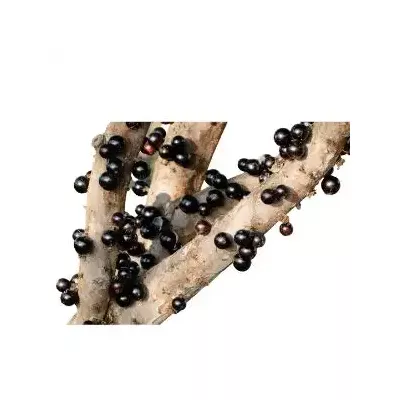



Sabara is a very tasty variety of jaboticaba. Layered Sabara Jabuticaba plants matures in 2-3 years time. Seedlings may take 10 years or more to mature.
The jabuticaba fruit is unique in that it grows directly on the trunk and branches of the tree. This is rather than from the ends of the branches like most other fruit trees. Jabuticaba or Jaboticaba is native to Brazil.

Pay using UPI, Card or Netbanking

Shipping within 3 working days
Jaboticaba, or Plinia cauliflora, is a fruit tree native to Brazil and other parts of South America. Though the fruit looks somewhat similar to grapes, it has a distinct taste
Jaboticaba grows very slowly but can reach up to 10 to 12 metres, although usually it is about 5 to 6 metres. Like its native Amazonian climate, prefers a humid tropical climate. Jaboticaba grows well in slightly acidic soils, including sandy, loamy, and clay soils.
Jabuticaba is known for its unusual growth habit, i.e., fruiting happens directly on the trunk and large branches, which gives it a distinct and attractive appearance.
Unless for the purpose of shaping, pruning is usually not done.
Jaboticaba requires full sun and also plenty of water. It grows slowly during the initial years and depending on the variety fruiting starts in 3-12 years. However, with layering, late-maturing varieties fruits in as less as 3-4 years.
Though a slow starter, jabuticaba grows in to a mid-size to large tree. The recommended planting distance is 18 to 20 feet.
Jaboticaba is suitable for growing in containers, provided they are large enough to accommodate the tree's size and root system. In fact, some varieties like the Sabara, fruit earlier when planted in a container.
Jabuticaba is round or oval-shaped, dark purple to black in colour, and typically measures about 1 to 1.5 inches (2.5 to 4 cm) in diameter. The skin is thin and delicate, and the pulp is white or pink, with a sweet, grape-like flavour.
Jabuticaba fruit is highly perishable and has a short shelf life. Eat Jaboticaba fresh or process it soon after harvesting. It is used as a substitute for grapes in making wine.
The fruit of Jabuticaba is rich in vitamin C, iron, and calcium. It's tree bark and leaves are used to treat a variety of ailments, including respiratory problems and diabetes.
Data sheet